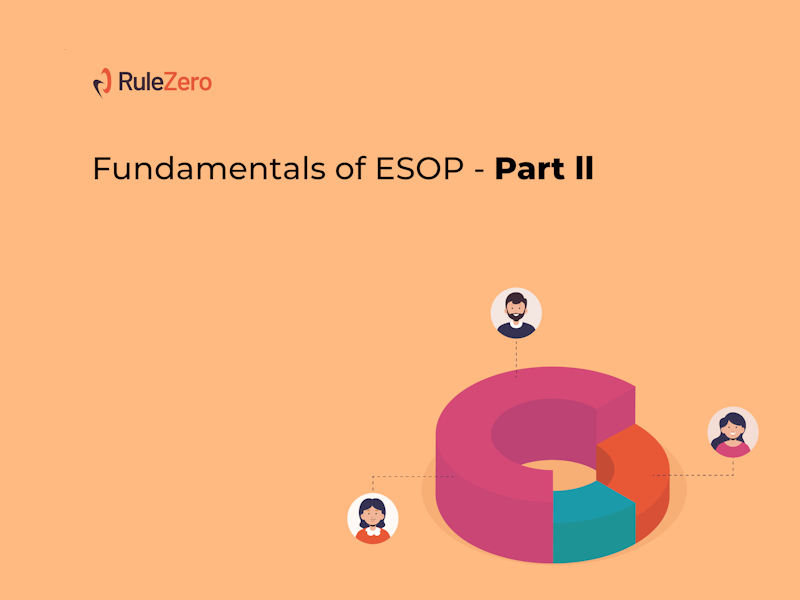Welcome back to our FAQ series on ESOPs! In this second installment, we dive deeper into the world of Employee Stock Ownership Plans (ESOPs) to provide you with the essential information you need. Our goal is to empower you with knowledge so that you can make informed decisions regarding your ESOPs. So, let’s dive in!
1. How easy or difficult is it for a company to make grants?
Granting is the first stage in the ESOP process. To make a grant, the company must have a stock option plan in place. The plan needs to be adopted by the shareholders of the company by way of a special resolution. Once the company adopts a plan, the Board can start making grants.
While making a grant, a number of questions arise. For example:
- What kind of ESOPs should be granted? Will the individuals who hold the options have a right to acquire shares or simply a right to participate in the company’s growth?
- What should be the pre-conditions attached to ESOPs ? Time based, performance based or event based?
- Which individuals should be granted ESOPs? All employees or just a handful?
- What should be the quantum of ESOPs to be granted to the individuals selected for the grant?
Once you arrive at the answers to these questions, the ESOP documentation is executed with each of the grantees. The employees receive a grant letter that specifies the terms and conditions applicable to the options granted under a particular ESOP plan of the company.
Grants made under plans that are not adopted in this manner are not valid. The grantee cannot get any legal rights under such grants and the company is not bound by such grants.
Welcome back to our FAQ series on ESOPs! In this second installment, we dive deeper into the world of Employee Stock Ownership Plans (ESOPs) to provide you with the essential information you need. Our goal is to empower you with knowledge so that you can make informed decisions regarding your ESOPs. So, let’s dive in!
2. Can an option grant be backdated?
Typically, backdating any document comes with legal risks. This will particularly be true if by backdating you are seeking to get around some legal requirements. For instance, the law requires that every grant is subject to a one year cliff, i.e., a minimum of one year must pass for options to vest. This requirement cannot be avoided by backdating options.
3. Does being granted an option guarantee that the grantee will become a shareholder?
No. Being granted an option is by no means a guarantee that the grantee will become a shareholder.
Firstly, the options need to vest. Only upon the vesting conditions being satisfied, will the right to acquire the shares fructify.
Secondly, the grantee must exercise the options as per the terms and conditions set out in the option plan. Some option plans provide for free exercise of vested options. Other plans provide for exercise only as part of buyback programmes, post a listing of the equity shares or as part of an M&A.
4. What happens when a grantee dies or suffers other forms of disability that prevents her or him from working?
Globally, the practice is that vesting stops when a grantee stops working with the company. However, the law in India provides that unvested options of the grantee vest immediately. The legal heirs become entitled to exercise the vested and the accelerated unvested options.
5. Are options transferable? If not transferable, what happens to the options on the demise of a grantee?
No. Options cannot be transferred. However, upon the untimely demise of a grantee, all options granted automatically vest in the legal heirs of the grantee. To facilitate this, companies typically ask the grantee to nominate a legal heir.
6. Is every employee entitled to receive options?
Options are granted strictly at the discretion of the company. No employee can ask for options to be issued to her or him as a right.
7. Does grant of options mean the employment cannot be terminated?
Grant of options does not guarantee employment in any form. Employment may be terminated by the company at any time in accordance with the terms of employment. Typically, vesting stops upon employment ending, whatever be the reason for the termination of the employment.
8. What happens to options if an employee is transferred to a different group within the same company or a different company of the same group?
These are practical questions and need to be addressed in the plan and the terms of the grant. The simple answer is that if the plan is silent, the grant continues even if the employee is transferred to a different group within the same company. In the case of transfers to other group companies, the options will lapse (unless the Plan provides otherwise). The nature of the grant may also have an impact on the options in such situations.
Planning, administering and managing ESOP requires a deep subject knowledge, and not to mention also involves huge administrative costs. Adequate documentation and transparency tend to make the entire ESOP process smooth.
More in this Series
- Part I – Fundamentals of ESOP – Part 1
- Part III- FAQs on ESOP for the Employees
- Part IV – Regulatory aspects of ESOPs
- Part V – ESOPs as a hiring strategy
- Part VI – Wealth creation through ESOPs







